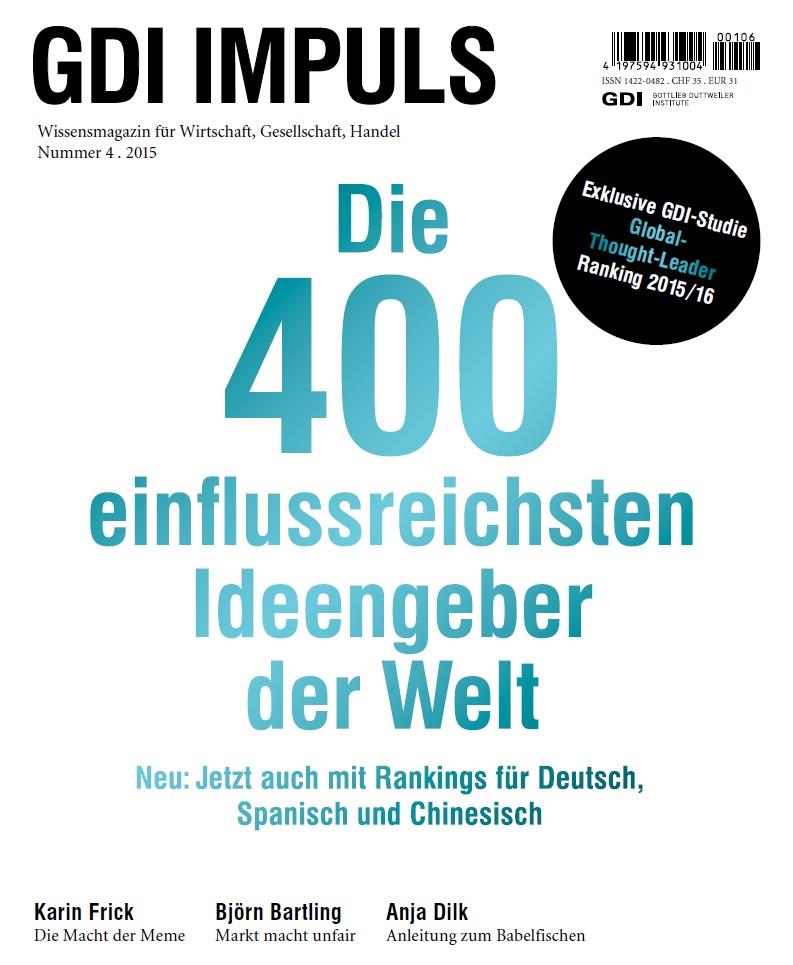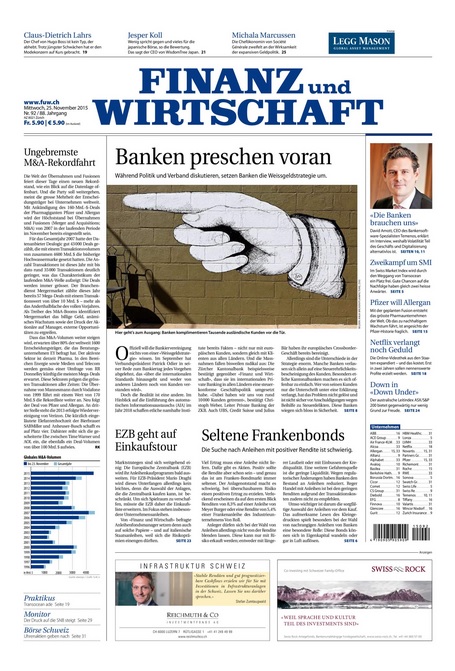Navigation auf uzh.ch
Navigation auf uzh.ch
2015-12-22: We can learn to empathize with strangers. Surprisingly, positive experiences with people from another group trigger a learning effect in the brain, which increases empathy. As Grit Hein, Philippe Tobler, Jan Engelmann, and Marius Vollberg from the University of Zurich reveal, only a handful of positive learning experiences already suffice for a person to become more empathic.
Conflicts between people from different nationalities and cultures often stem from a lack of empathy or compassion for “the stranger”. More empathy for members of other groups could thus encourage peaceful coexistence. A study conducted by the University of Zurich examined whether empathy with strangers can be learned and how positive experiences with others influence empathic brain responses.
Hein, G., Engelmann, J.B., Vollberg, M., & Tobler, P.N. How learning shapes the empathic brain. In: Proceedings of the National Academy of the United States of America.

2015-12-09: In an interview with GDI Impuls, Björn Bartling gives a mixed response to the titular question. On the one hand, he finds positive and stable levels of socially responsible behavior in several experimental market studies, conducted in Switzerland and China. On the other hand, the comparison of behavior in market and non-market contexts reveals that market behavior follows weaker prosocial norms than behavior in other contexts.
GDI Impuls Wissensmagazin (in German) (PDF, 3 MB)
2015-12-08: Joachim Voth has been invited to deliver the 2016 Hicks Lecture at All Souls College, Oxford. Named after Sir John Hicks, Nobel Laureate in Economics (1972), the lectures bring prominent economic historians to Oxford to give a keynote. Speakers in recent years have included Claudia Goldin, Joel Mokyr, Jeffrey Williamson, Christina Romer, Peter Temin, and Robert Allen. The lecture will take place on April 26.

2015-11-26: Thanksgiving. That magical time of the year when the generations gather and test out all the ways that they can enrage each other. Mothers and sons, fathers and daughters, all engaged in loud, pointless arguments about Ben Carson and Israel, just as the pilgrims intended. It's as good an occasion as any to wonder: Why have children at all, if they make you this miserable?

2015-11-26: The return on the AHV should be adapted to the production growth and demographic trends, the second pillar should be strictly guided by the market interest rates.
The industrialized countries need to deal with the consequences of the rapid aging of the population. The demographic dynamics pose a problematic situation for the two key institutions of the modern welfare state: the health and pension system. High quality performance and generous pensions are being demanded, which in reality is very hard to maintain since there are more people retiring than working.

2015-11-17: Fabrizio Zilibotti has been invited to give the “Walras-Bowley Lecture” at the 2016 North American Meeting of the Econometric Society. The Meeting is hosted by the Wharton School and the Department of Economics at the University of Pennsylvania and will take place from June 16 to 19, 2016.
Fabrizio Zilibotti is President Elect of the European Economic Association (EEA) and will be President in 2016.
Video about European Economic Association (EEA)

2015-09-25: A new study by researchers at the University of Zurich challenges the prevailing view that female genital cutting is predominantly a norm based on all families trying to be alike.
According to the study, published in Science, families actually vary tremendously in matters related to cutting. This indicates that heterogeneous motives at the family level play a crucial role when parents decide whether to cut their daughters. The results question the assumptions behind many programs that attempt to reduce cutting. Worldwide an estimated 125 million girls and women are cut despite the fact that female genital cutting leads to serious health problems throughout life. Development agencies spend considerable resources each year on programs that attempt to reduce cutting. These programs are often based on the assumption that cutting is a deeply entrenched social norm arising from a strong need for families to be alike.
Press release in English (UZH Mediadesk)
Medienmitteilung auf Deutsch (UZH Mediadesk)
SCIENCE publication

2015-09-17: On September 17, 2015, the Department of Economics – together with the Müller-Möhl Foundation – hosted a public lecture by Richard H. Thaler, who is Ralph and Dorothy Keller Distinguished Service Professor of Behavioral Science and Economics at the University of Chicago Booth School of Business.
Read the whole article (PDF, 758 KB)
Video of Thaler Event
NZZ article (in German)
Foto Gallery
2015-09-15: The economists at the University of Zurich (UZH) have once again attained excellent ratings in the 2015 edition of the economics ranking of the German newspaper Handelsblatt. The UZH Department of Economics, with 23 economics professors, ranks third amongst the top economics departments in German speaking countries.
As usual, the UZH Department of Economics leads the top journal ranking (top journals A+). The researchers with the highest number of top publications at the department are Ernst Fehr (2nd) and Joachim Voth (7th), followed by Björn Bartling (14th). Furthermore, young professors such as David Dorn and Nick Netzer are found among the top ten researchers in the “Top-100 economists under 40” ranking.
With the hiring of further highly qualified researchers the department ensures the ongoing growth of its faculty. Recently, Prof. Pietro Biroli, Prof. Rema Hanna, Prof. David Hémous, and Prof. Hannes Schwandt joined the department.
Top Economic Faculties (in German)
Best Research Performance “A+” (in German)
Top-100 economists under 40 “A+” (in German
OEC News (in German)
2015-09-14: The economists Hans-Joachim Voth (University of Zurich), and Nico Voigtländer (University of California) show that Germans who grew up under the Nazi regime are much more anti-Semitic than those born before or after that period.
Interview with Joachim Voth (in German)
TV segment on 3sat (in German)
2015-09-06: The Swiss newspaper “Neue Zürcher Zeitung” recently published its second ranking of the most influential economists of Switzerland. Ernst Fehr is once again top of the list, followed by Jan-Egbert Sturm und Bruno S. Frey. In addition to the scientific achievements of the candidates, the ranking takes account of their presence in the media and their relationship with politicians and public authorities.
In parallel with Switzerland, respective newspapers have published the results for Germany and Austria. Fehr is number two in Germany and number one in terms of research citations in Austria.
NZZ article (in German)
FAZ article (in German)
2015-09-04: The youngest children in class receive more often a diagnosis for Attention Deficit Disorder (ADHD). Scientists have a banal explanation.
Article in Frankfurter Rundschau Online (German)
2015-08-27: A mid-career crisis can happen to anyone. It can hit even those who objectively have the most fulfilling jobs. When it does, it inflicts pain on the individual suffering it and causes productivity losses for employers.
Link of BYU radio segment
Article Harvard Business Review
2015-08-21: Which meal would you like today, chicken or pasta? For such value-based choices, organisms must flexibly integrate various types of sensory information about internal states and the environment to transform them into actions. A new study by Christian Ruff alongside Rafael Polania, Marius Moisa, Alexander Opitz, and Marcus Grueschow shows that preference-based decisions were less stable if the information flow between the two brain regions was disrupted. The test subjects were therefore more indecisive.
Press release UZH in English
Press release UZH in German
Nature Communications Article
Media Coverage
Science Daily
NeuroScientistNews
Medical Xpress
Medizin Aspekte (in German)
Schweiz Magazin (in German)
2015-08-05: Stressful events occur frequently in daily life and can affect the way we make routine decisions. For example, what we decide to have for lunch may be impacted by a challenging morning meeting or an interaction with an upset client at work. A new study by Todd Hare and Silvia Maier found that when individuals chose between different food options after having experienced the stressful ice bath treatment, they overweighed food taste attributes and were more likely to choose an unhealthy food compared with people who were not stressed.
Media Coverage
Huffington Post
LA Times
abc News Radio
SRF 4 News (in German)
Limmattaler Zeitung (in German)
Die Presse.com (in German)
2015-07-30: Decision rights carry not only instrumental value but may also be valuable for their own sake. The ideas of autonomy, freedom, and liberty derive their intuitive appeal—at least partly—from an assumed positive intrinsic value of decision rights. Providing clean evidence for the existence of this intrinsic value and measuring its size, however, is intricate. Björn Bartling, Ernst Fehr, and Holger Herz developed a method capable of achieving these goals. The data reveal that the large majority of the subjects intrinsically value decision rights beyond their instrumental benefit.
NZZ article (in German)
Working Paper
2015-07-27: Jaume Ventura (Universitat Pompeu Fabra) and Joachim Voth (Zurich University) say that when the dangers of debt in today’s world are considered, the potential benefits should not be forgotten. Looking at the conditions under which the Industrial Revolution in Britain took place, the researchers ask why the country that borrowed the most industrialised first.
2015-07-08: Sovereign debt is presumed to be problematic. According to Joachim Voth, there are at least three positive aspects to public sector loans.
Article in Finanz und Wirtschaft (German)
2015-07-01: The UBS Center of Economics in Society organized a high-profile international conference on “The Economics of Sovereign Debt”. The scientific organizing committee comprised Raquel Fernandez and Kjetil Storesletten, who are member of the advisory board of the UBS Center, and Fabrizio Zilibotti.
The conference took place on June 23-24, 2015, at the University of Zurich.
2015-06-10: In their recently published paper, Hans-Joachim Voth and Nico Voigtländer use survey data on anti-Semitic beliefs and attitudes in a representative sample of Germans to show that Nazi indoctrination was highly effective. Between 1933 and 1945, young Germans were exposed to anti-Semitic ideology in schools, in the (extracurricular) Hitler Youth, and through radio, print, and film. As a result, Germans who grew up under the Nazi regime are much more anti-Semitic than those born before or after that period.
2015-06-10: Andreas Müller, Kjetil Storesletten, and Fabrizio Zilibotti say the best response to the Greek debt crisis is pragmatism and sequential compromise. The economists plead for an assistance programme providing the country with debt relief.
www.voxeu.org
2015-06-09: Think that hiring lower-wage workers to replace more expensive employees will increase profits? Think again. Lower wages don’t improve profits because neither the new lower-wage earners nor the existing higher-wage employees worked as hard. And the new workers’ reduced income also reduced their social welfare.
Accountingweb (online)
2015-06-08: NZZ-Chefredaktor Eric Gujer und NZZ-Journalist Marco Färber unterhalten sich mit Ernst Fehr über das Thema "Ökonomische Forschung für eine bessere Welt?".
NZZ Standpunkte (online)
2015-06-05: In Zusammenarbeit mit Professor Michel Maréchal vom Department of Economics der Universität Zürich und der Excellence Foundation Zurich wurde eine qualitative Befragung im deutschsprachigen Raum in Bezug auf die soziale Identität durchgeführt. Die Ergebnisse der GDI-Studie zeigen, dass unser Verhalten je nach Rolle variiert. Unsere sozialen Identitäten – Mutter, Cellist, Veganerin oder Bankangestellter – beeinflussen unser Verhalten stärker als angenommen. Das zeigt die Verhaltensökonomie.
Link zur GDI-Studie
2015-06-05: Does the way that markets operate have a corrupting influence on people’s behavior? Outside of a market context, how much do consumers care about making socially responsible choices? Roberto A. Weber says there’s a lot of evidence that market competition largely crowds out concern for other people’s well-being.
The full text of this article is only available to subscribers.
Standford Social Innovation Revue (online)
2015-05-07: In his opening address at the Citywire Montreux 2015, Joachim Voth said the ECB’s stimulus measures are not doing enough to dispel the fear of a ‘full-blown’ European crisis. According to Voth, political support for measures are on an increasingly fragile footing which could lead to an economic collapse in the next 12-to-24 months.
Read news on Cytywire webpage
2015-01-26: Hans-Joachim Voth hat Wirtschaftsgeschichte in Mode gebracht - mit Studien über Hitler und Staatsbankrotte.
Artikel in der Frankfurter Allgemeine Zeitung (PDF, 872 KB)
2015-05-07: Simon Alder (PhD, University of Zurich, 2014) has been awarded the "1. Nachwuchspreis für praxisrelevante Entwicklungsforschung" of the Verein für Socialpolitik. The prestigious prize has been awarded in recognition of his dissertation "Essays in Economic Policy and Development". The award ceremony will be held at the Annual meeting of the Economic Development Committee of the Vereins für Socialpolitik, at Kiel, 12.-13. Juni, 2015.
2015-04-25: The power pose, proven by science to improve confidence before a big speech, was then refuted by further science to have that effect. The original finding will probably live on, because some theories are harder than zombies to kill.
he National UAE (online)
2015-04-10: Starting in June 2015, Joachim Voth will be a Joint Managing Editor at The Economic Journal. The journal belongs to the Royal Economic Society, which is one of the oldest and most prestigious economic associations in the world.
The Economic Journal
2015-03-26: Despite widespread media coverage of an earlier study showing that “power poses” influence hormones and risk taking, a new study using a much larger sample finds no such relationships.
Eva Ranehill, Anna Dreber, Magnus Johannesson, Susanne Leiberg, Sunhae Sul, Roberto A. Weber. Assessing the Robustness of Power Posing: No Effect on Hormones and Risk Tolerance in a Large Sample of Men and Women. Psychological Science. March 26, 2015.
Press Release (EN) (PDF, 201 KB)
Pressemitteilung (DE) (PDF, 19 KB)
Finanznachrichten WirtschaftsBlatt Sciencenewsline2015-03-12: David Dorn (together with David Autor and Gordon H. Hanson) explain why blocking the Trans-Pacific Partnership (TPP) on fears of globalization would be a mistake.
The Washington Post
2015-01-20: Fabrizio Zilibotti has accepted the offer to become co-editor of Econometrica, one of the top-5 economics journals. Zilibotti will be in office as of July 2015.
Fabrizio Zilibotti is President Elect of the European Economic Association (EEA) and will be President in 2016. He is the former chief editor (2009-14) of the Journal of the European Economic Association, a former director and managing editor (2002-06) of the Review of Economic Studies, and an Associate Editor of the Journal of Economic Growth and of China Economic Review.
Econ Announcement
2015-02-19: Er gilt als der Totengräber des „Homo oeconomicus“. Der Hirnforscher interessiert sich für das, was viele Ökonomen weglassen. Dazu schaut er in unsere Köpfe. Dort findet Fehr Ängste – und einen Sinn für Fairness.
Artikel in der Handelszeitung
2015-02-13: Wer glaubt, dass sich das Problem Griechenland nur mit Härte lösen lasse, riskiert, dass im Namen falsch verstandener ökonomischer Prinzipien grosser Schaden entsteht. Ein Kommentar von Fabrizio Zilibotti.
Artikel der Finanz und Wirtschaft
2015-02-01: The University of Zurich has appointed Prof. Rainer-Winkelmann as new Chairman of the Department of Economics as of February 2015.
Econ Announcement (PDF, 100 KB)
2015-01-21: Der Schweizer Franken gilt als Segen für die Volkswirtschaft. Doch in den letzten Jahren ist er zum Fluch geworden. Braucht die Schweiz ihre Währung überhaupt noch?
Artikel im Tagesanzeiger
2015-01-20: Wenn man einen Menschen schätzt, zeigt man sich ihm gegenüber meist grosszügiger und ist eher bereit zu teilen, als gegenüber Unbekannten. Zürcher Neuroökonomen haben gemeinsam mit deutschen Wissenschaftlern die Gehirnbereiche entschlüsselt, die zu diesem Verhalten führen. Die Ergebnisse könnten dazu beitragen, ökonomische Theorien zu ergänzen und die Ursachen von sozialen Verhaltensstörungen besser zu verstehen.
Artikel auf moneycab.com
2015-01-19: Wer Blasen zum Platzen bringt, ist nicht populär. Es darf aber nicht unterschätzt werden, wie dringend die SNB den geringen zusätzlichen Spielraum braucht, den sie mit der Aufgabe der Euro-Bindung wieder gewinnt.
Artikel in der NZZ (PDF, 187 KB)
2015-01-09: Die separatistischen Tendenzen in Europa – zum Beispiel Katalonien oder Schottland – lassen sich ökonomisch erklären. Die erfolgreichsten und reichsten Länder des Kontinents sind klein. Ein Kommentar von Joachim Voth.
Artikel Finanz und Wirtschaft
2015-01-09: The Department of Economics is currently in the process of interviewing candidates for several assistant professorships. In connection with the interviews, there will be nine public presentations over the next three weeks. The department invites all interested parties to visit these extraordinary speeches on diverse subjects. For more information, please visit the Econ Agenda.
Econ Agenda
2015-01-02: Econmists measure their influence by looking at their publication count. In an effort to gauge clout outside the ivory tower, The Economist asked Appinions, a startup that analyses influence online, to look at a list of 500 economists—the 450 atop the RePEc list, plus some we chose ourselves. Appinions tracked how much attention was paid to their utterances in the mainstream media, the blogosphere and in social media over a 90-day period up to December 11th 2014. That produced an alternative influence ranking.
Article in The Economist
Artikel in der NZZ
Artikel in der Bilanz